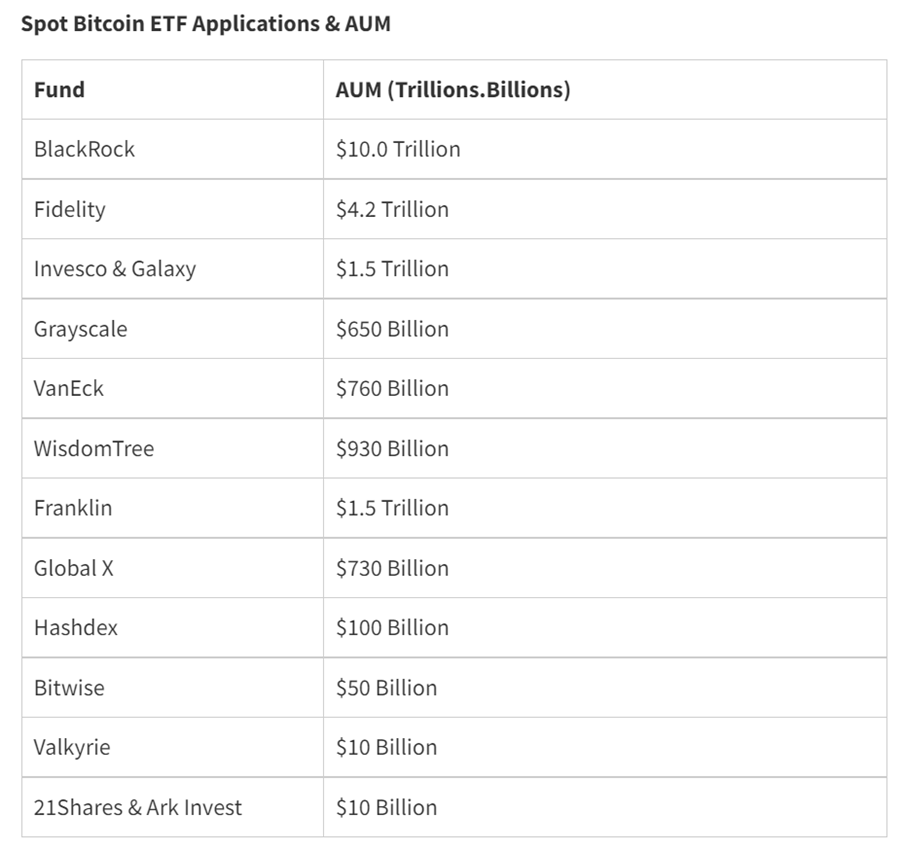It's been a while since writing this newsletter - with little activity in the crypto market, we have been trading sideways - until recently.
In this article, I want to dig into 3 key things driving the next bull market in digital assets:
The 3 drivers are:
- The Securities and Exchange Commission declines to appeal a landmark court case loss to the biggest bitcoin trust in the US.
- Twelve ETFs are lined up and waiting to launch their bitcoin ETFs with ~$22T assets under management (AUM)!
- How a change in accounting rules could drive significant institutional inflows into bitcoin
The detail:
1. The Securities and Exchange Commission declines to appeal a landmark court case loss to the biggest bitcoin trust in the US.
The SEC's decision not to appeal a landmark court case loss against Grayscale's application to convert its bitcoin trust fund into an ETF is a major development. The court ruled that the SEC's denial of the spot bitcoin ETF application in light of approving a more volatile futures based ETF was 'arbitrary and capricious'.
The likelihood of the ETF getting approved looks all the more likely when considering the SEC's own Commissioner: Hester Pierce commented on a live CNBC interview: "I've been thinking we should approve one for the last 5 years". Whilst the SEC still has the ability to delay approval of the ETFs further, the legal justifications for not approving it look to have been largely exhausted.

2. Twelve ETFs are lined up and waiting to launch their bitcoin ETFs with ~$22T AUM!
If, or perhaps more likely when the bitcoin ETFs obtains approval, it's worth looking at what this could mean. Currently, there are ~12 spot bitcoin ETF applications from funds that have ~$22T AUM. The current market cap of bitcoin is ~$666B for context.
Notably, for every $1B increase in net purchases the increase in price and market cap can increase disproportionately as prices and markets are valued based on the fringe, not the average. If you're not sure what I'm talking about, watch this video to understand how an order book works using the analogy of a deck of cards. Skip to 13:34 of this video.

So what are most people missing about the whole ETF hype?
Apart from the obvious, it's the first time we'll see large institutional inflows into an asset that has perfectly scarce supply. You cannot make more bitcoin simply because demand increases.
Furthermore, not having access to an ETF is actually a key reason many institutions haven't explored buying bitcoin yet. Companies trying to buy bitcoin and custody it are presented with a number of regulatory, policy, technology and accounting barriers that largely have stopped any serious institutional inflows until now.
Think how risk averse pension funds and S&P500 companies would be to buying crypto using an exchange after the FTX debacle. The ability to buy bitcoin through a regulated ETF product makes the investment easy and part of a familiar process for large corporates, sovereign wealth funds, financial advisors and everyday investors that just don't want to get burned by another crooked crypto founder a-la Sam Bankman-Fried.

3. How a change in accounting rules could drive significant institutional inflows into bitcoin
The last area I wanted to touch on in this article is the recent changes to the treatment of digital assets under fair value accounting announced from the the Financial Accounting Standards Board (FASB).
Put simply, under the previous accounting treatment of bitcoin known as 'indefinite intangible accounting', if Apple was to buy $1B of bitcoin, and the price fell by 50%, Apple's CFO would have to mark down their balance sheet as having a $500m impairment.
However, if the price of bitcoin went back up and doubled, Apple would not be able to write up the new value of bitcoin to $1B. However, under the new rules, Apple, or any company investing in bitcoin as a treasury asset will now be able to write up and down the value of its digital assets held under fair value accounting. This is significant when thinking about how many public CFOs simply wouldn't entertain buying bitcoin or other digital assets for the potential problems it could create for shareholder reporting and ability to raise capital.
To conclude, the developments covered above represent a significant shift in the treatment of digital assets, and bitcoin specifically. The emergence of bitcoin as a legitimised investment, along with the launch of an ETF and more favourable accounting treatment seems likely to drive significant additional volume and price action in the years to come.
Whilst I remain structurally bullish long-term, it is also worth being aware that the current economic situation is uncertain - higher for longer interest rates, high inflation and low growth. In the US 62% of Americans are living between paychecks so for investment assets like bitcoin and other cryptocurrencies that have been largely untested in a quantitatively tightening and high interest rate environment, it will be a period of discovery.
Trading this market with less than a 5 year time horizon is likely to be too volatile for most, but I think at the end it will be worth it.
.png)
.png)